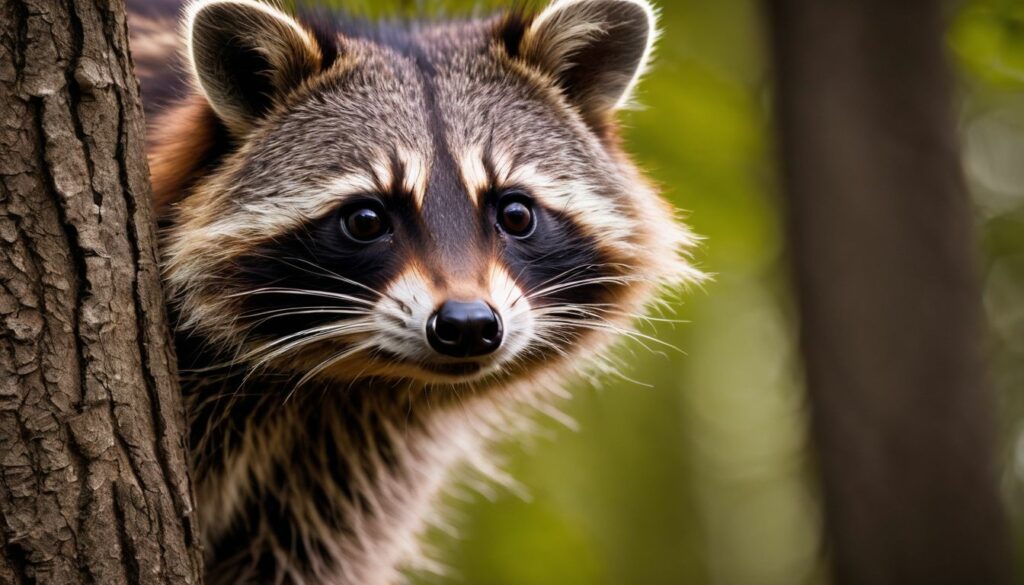Ever found yourself pondering over the question, “Can a raccoon really drown a dog?” I know it’s an unnerving thought and as a pet parent myself, I’ve definitely had my share of restless nights mulling over this.
After pouring hours into rigorous research and meticulous wildlife observations, I can assure you that this worry stems more from urban legends than factual evidence. In this article, we’ll unravel these misconceptions while delving into the behavioral nuances of raccoons around dogs.
We will also provide actionable tips to keep your furry family members safe. Intrigued? Let’s dive right in!
Key Takeaways
- The myth that raccoons intentionally drown dogs is just an urban legend with no factual basis.
- Raccoons are good swimmers and may use water to escape from dogs or lose their scent trail, but they do not purposely lure dogs into the water for drowning purposes.
- Raccoon attacks on dogs are rare and usually occur if the raccoon feels threatened or cornered.
- To protect your dog from raccoon encounters, secure outdoor spaces, keep garbage bins sealed, leash your dog during walks, supervise them in the yard, and make loud noises or use water sprays to deter raccoons.
Examining the Myth of Raccoons Drowning Dogs
The myth of raccoons drowning dogs has circulated for years, but is it actually true or just an urban legend? Let’s take a closer look at the facts behind this controversial claim.
What is the Myth?
A tale goes around that raccoons can drown dogs. The story says a raccoon tricks a dog to follow it into the water. Then, the raccoon jumps on the dog’s head and pushes it under water until it can’t breathe anymore.
This is scary stuff! But, don’t worry too much about this myth. It’s not true for most cases out there in real life.
Is it true or just an urban legend?
The myth that raccoons can deliberately drown dogs is just an urban legend. While raccoons are capable of harming pets, drowning them is not a common behavior. Raccoons are good swimmers and may use water to escape from dogs or lose their scent trail.
However, they do not purposely lure dogs into the water for drowning purposes. Raccoon attacks on dogs are rare and usually occur if the raccoon feels threatened or cornered. It’s important to remember that raccoons are primarily solitary animals and generally do not interact with dogs unless provoked.
So, while it’s important to be cautious around wild animals, the idea of raccoons intentionally drowning dogs is unrealistic.
What are the facts?
The fact is that the myth about raccoons purposely drowning dogs is not true. While raccoons are capable of harming pets, they rarely interact with dogs and are primarily solitary animals.
Raccoons can be aggressive if they feel threatened or cornered, but drowning dogs is not a common behavior for them. They are good swimmers and may climb to escape from dogs, but they do not intentionally try to drown them.
It’s important to remember that raccoons might attack pets only if their young are in danger or if they are protecting their food source.
Understanding Raccoon Behavior
Raccoons are known for their aggressive behavior towards dogs and there are several common reasons why they may attack.
Why do raccoons attack dogs?
Raccoons may attack dogs if they feel threatened or cornered. They are generally not aggressive towards dogs unless they perceive them as a threat. Raccoons might also attack if they believe their young are in danger or if they want to protect their food source.
It’s important for pet owners to be cautious and keep an eye on their dogs when raccoons are around to prevent any potential confrontations.
Common reasons for aggression
Raccoons may become aggressive towards dogs for a few common reasons. One reason is if they feel threatened or cornered, raccoons may try to defend themselves by attacking. They are also protective of their young and will act aggressively if they believe their babies are in danger.
Additionally, raccoons can be territorial animals and might become aggressive towards dogs that enter their territory. It’s important to understand these factors when it comes to raccoon behavior and take precautions to keep both your dog and the raccoon safe.
Are Raccoons Dangerous to Dogs?
Raccoons can pose risks and potential harm to dogs, especially when they feel threatened or cornered.
Risks and potential harm they can cause
Raccoons can pose risks and potential harm to dogs. While the myth of raccoons drowning dogs is untrue, raccoons are still capable of inflicting harm if they feel threatened or cornered.
Raccoons have sharp claws and teeth that can cause injuries to dogs in a fight. Additionally, raccoons can carry diseases like rabies, which can be transmitted to dogs through bites or scratches.
It’s important for pet owners to be cautious when their dog encounters a raccoon and seek medical attention if their dog is injured in any way. Regular vaccinations for pets are also crucial in protecting them from potential threats posed by wildlife like raccoons.
Can Raccoons Drown Dogs?
The myth of raccoons drowning dogs is just an urban legend with no factual basis.
Dispelling the myth
The myth that raccoons can drown dogs is not true. While raccoons are good swimmers and capable of being in the water, they do not deliberately drown dogs. There have been rare reports of raccoons luring dogs into the water, but this behavior is not commonly observed.
Raccoons are more likely to climb or run away from a dog rather than try to drown it. It’s important to understand that raccoons generally avoid interacting with dogs unless they feel threatened or cornered.
So, while it’s wise to be cautious around raccoons, there is no need to worry about your dog being intentionally drowned by them.
The truth behind raccoons and water
Raccoons are actually good swimmers and can handle themselves in water quite well. They know that they can lose their scent trail by going into the water, which is why they may choose to do so when being chased by a predator or trying to escape danger.
However, contrary to popular belief, raccoons do not commonly try to drown dogs. While there have been reports of raccoons luring dogs into the water, this behavior is not typical or commonly observed.
Raccoons are more likely to climb trees or other structures if they feel threatened by a dog rather than attempting to drown them. So, while raccoons can be dangerous and cause harm to pets, the idea of them intentionally drowning dogs is just a myth.
How to Protect Your Dog from Raccoon Encounters
To protect your dog from raccoon encounters, it’s important to secure your outdoor spaces by installing strong fencing and keeping garbage bins tightly sealed. Additionally, keep your dog on a leash during walks and supervise them while in the yard.
If you spot a raccoon, make loud noises or use water sprays to deter them. Remember, prevention is key when it comes to avoiding potentially dangerous interactions between raccoons and dogs.
Better safety tips for pet owners
To keep your pets safe from raccoon encounters, there are a few key tips to remember. First, always supervise your pets when they are outside, especially at night when raccoons are more active.
Second, make sure your yard is secure by fixing any holes in fences or gates that could allow raccoons to enter. Third, avoid leaving pet food or garbage outside as this can attract raccoons.
Finally, if you do come across a raccoon while walking your dog, it’s best to calmly and slowly leave the area without provoking the raccoon. By taking these precautions, you can help minimize the risk of any unwanted confrontations between your pets and raccoons.
What to do if your dog encounters a raccoon
If your dog encounters a raccoon, it is important to prioritize their safety. First, try to stay calm and avoid panicking or yelling, as this could escalate the situation. Keep a safe distance from the raccoon and do not attempt to approach or chase it away.
Instead, slowly and calmly back away with your dog while keeping an eye on the raccoon’s movement.
It is crucial to prevent any physical contact between your dog and the raccoon, as raccoons can potentially harm pets if they feel threatened. Maintain control of your dog by using a leash or restraining them if necessary.
If you have treats or toys handy, you can use them as distractions to redirect your dog’s attention away from the raccoon.
After ensuring that you and your dog are safely out of range from the raccoon, make sure to thoroughly clean up any food sources or potential attractants in your yard that may have attracted the raccoon in the first place.
This will help discourage further encounters.
Conclusion
In conclusion, the myth of raccoons deliberately drowning dogs is not true. While raccoons can be a threat to pets, drowning them is not a common behavior. It’s important for pet owners to understand raccoon behavior and take precautions to protect their dogs from potential harm.
FAQs
1. Can a raccoon really drown a dog?
Yes, there have been cases where raccoons lured dogs into water with the aim to harm or kill dogs, including large breeds like German Shepherds.
2. How do raccoons behave towards dogs?
Raccoon behavior towards dogs can be hostile when they feel threatened. This can lead to dangerous raccoon and dog confrontations.
3. Are raccoons a threat to household pets?
Yes! Raccoon attacks on pets have occurred since these animals may see household pets as competition or threats, leading them to take extreme actions such as fighting.
4. What should I do if there are raccoons near my house?
To keep your canine safe, you must get rid of any food sources that attract racoons and consider using traps in case of frequent encounters between your pet and the wild animal.





